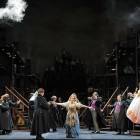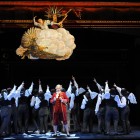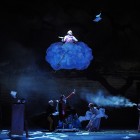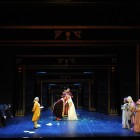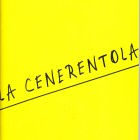Cenerentola 2018Opéra de Lyon
Read more about the opera Cenerentola
The operatic offering at the 2018 Edinburgh International Festival consisted of three fully staged productions imported from leading French companies. There were also two concert performances.
In recent years we have heard several of Rossini's less frequently performed operas. Now we could see, together for the first time here, his two most popular comic masterpieces. The Barber of Seville was presented by Le Théâtre des Champs-Elysées, on their first visit from Paris and La cenerentola by the familiar and welcome Opéra de Lyon.
In addition, John Gay's Beggar's Opera was performed by the Théâtre des Bouffes du Nord, from Paris, who had a substantial residency at the Festival. William Christie devised the musical side of this multinational coproduction.
The third instalment of Wagner's Ring, Siegfried, was performed in the Usher Hall. Sir Mark Elder conducting the Hallé; the all-star cast included Simon O'Neill (Siegfried), Christine Goerke (Brünnhilde) and Iain Paterson (Wanderer).
Continuing the mysteriouSamsons woodland theme, there was also a concert performance of Humperdinck's Hansel and Gretel, given by the RSNO under Sir Andrew Davis. Elizabeth DeShong (Hansel) and Laura Wilde (Gretel) led the cast.
Two important oratorios were also given in the Usher Hall. The Dunedin Consort performed Handel's mighty Samson and the Festival's opening concert was Haydn's Creation.
Director Stefan Herheim is one of the most celebrated talents currently working in opera, and he has created notable productions at the Bayreuth and Salzburg Festivals (Parsifal and Meistersinger respectively). In Britain, he is known for his spectacularly successful staging at Covent Garden of Verdi's Sicilian Vespers. Earlier in the summer his Pelléas had divided opinion at Glyndebourne. Rossini's humane comic masterpiece provided him with a completely different challenge, and it was fascinating to see what fresh ideas he came up with, even if they did not all work.
First to deal with the musical side. This was almost entirely superb. The conductor Stefano Montanari, himself an excellent violinist, produced a fizzingly idiomatic performance from the Lyon players. His pacing was just right in the difficult patter ensembles - the team were able to spit out all the wonderful consonants in 'Questo è un nodo avviluppato' with perfect precision. He was also sufficiently at ease to take part occasionally in repartee with the other performers.
There were no weaknesses among the singers. Canadian mezzo Michèle Losier had an appropriate voice for the role, with some nicely mournful contralto singing in her lower register. She was a lively actor, with no difficulty projecting character, which was distinctly sparkier than usual. The opera was being performed three nights running - hard work for everyone - but Ramiro was the only role to be double cast. At the second performance, the young French tenor Cyrille Dubois gave a very attractive performance. He possesses a beautifully sweet and expressive voice, no problems either with the difficult coloratura or the exposed high notes, particularly at 'Si, ritrovarla'. And he projected the natural goodness of the character with ease.
If anything even better was the Dandini. The part is unusually elaborate to sing, and many baritones really struggle with it. But Nikolay Borchev, from Belarus, seems to have made a special study of it - he coped with ease with all his fiendish roulades, while producing a wonderful comic creation - perhaps the greatest success of the evening. The tutor Alidoro was Simone Alberghini, an experienced performer (previously himself a highly regarded Dandini) who projected goodwill and gave an excellent turn with his long virtuoso showpiece 'Là del ciel'.
Don Magnifico and his daughters managed to project characters who were unusually three-dimensional, and all the better for it. Renato Girolami's characterization of Don Magnifico struck just the right balance between idiocy on the one hand and greed and tetchiness on the other. He also had to be quick with costume changes. The sisters were beautifully sung and nicely differentiated, as they must be, perhaps not quite as nasty as in some stagings. Returning local girl Katherine Aitken managed to bring the house down with a brief foray into (her) vernacular to get things going after the interval, while Clara Meloni was just as effective.
And now to that production. As a piece of stagecraft it was quite superb, with lots going on in design terms. The fireplace was used as a motif with larger models coming closer to the front until the last becomes a proscenium. It was just unfortunate that their movement caused a rumbling noise that interfered with Cinderella's final celebratory Rondo. There was a fairy-tale castle in the background and a huge rotating clock mechanism (though the striking of midnight doesn't feature in the operatic version). From near the start there was a flying cloud bringing characters in. One was an elderly Victorian gent - a Rossini lookalike (with helpful photo of the composer in the programme) and he had a pair of wings sprouting from his shoulders - but they were white, so he wasn't Ali d'oro, or 'Golden Wings', Ramiro's tutor, who was arranging all. He turned out to be Don Magnifico, which seemed odd. In the second half all the chorus had similar wings (oh yes, they were all Rossini-clones too). There was constant brandishing of a white quill pen, filling the role of pen, conductor's baton or magic wand as required. Its use at different times by the principals or chorus could be confusing. Costumes were of mixed period - most of the principals were in generic 'Jane Austen' but Magnifico much earlier, Restoration Comedy style. No matter.
There was a promenade gangway across the stalls so at intervals various characters could come off the stage and get between the pit and front row of seats. Ramiro's big solo with chorus took place here and was great fun. This all worked well if you were in the stalls or grand circle. Did it work for viewers higher up, though?
Now we come to what still seems problematic about the director's concept. All the way through, we, the audience, were given hints that all was not quite as it should be - and it really was quite unsettling. After all, the Cinderella story, whichever variant of it, traditional panto, operatic version, or whatever, has some basic givens, the most important of which is that Cinders gets her prince in the end. This was different. Right from the start our heroine has an unexpected element of bolshiness, showing her sisters and stepfather scant respect, having a joke at their expense with Alidoro - somehow not behaving quite as we expect our heroine to conduct herself. Once all the revelations are over it becomes more unsettling still. Her attitude to her prince is not simply casual or disrespectful but quite dismissive. Ramiro is clearly bewildered and well on the way to becoming hen-pecked if not worse. She eventually launches into 'Nacqui all'affanno' and sings her big Rondo. As she nears the climax, the chorus and other principals slide slowly backwards, leaving her alone. During the brief orchestral postlude (a few seconds only) strings attached to her ballgown tighten from behind, it is pulled off and dragged away, leaving her in her shift - and her broom drops from the flies with a thump. Yes, it has all been a dream.
Cinderella for grownups? Certainly the particular grown ups on Saturday seemed to love it. But it is hard to take an interpretation where the title character is deliberately made rather unsympathetic. Nevertheless, there was plenty to enjoy, and the eccentricities may not stick in the memory.
Performance Cast
- Clorinda daughter of Don Magnifico
- Tisbe Clorinda's sister
- Angelina known as Cinderella, Magnifico's stepdaughter
- Alidoro Ramiro's tutor, a philosopher
- Don Magnifico Baron of Montefiascone
- Don Ramiro Prince of Salerno
-
Taylor Stayton (Aug 24, 26)
Cyrille Dubois (Aug 25)
- Dandini the Prince's valet

